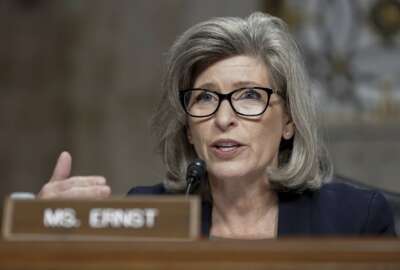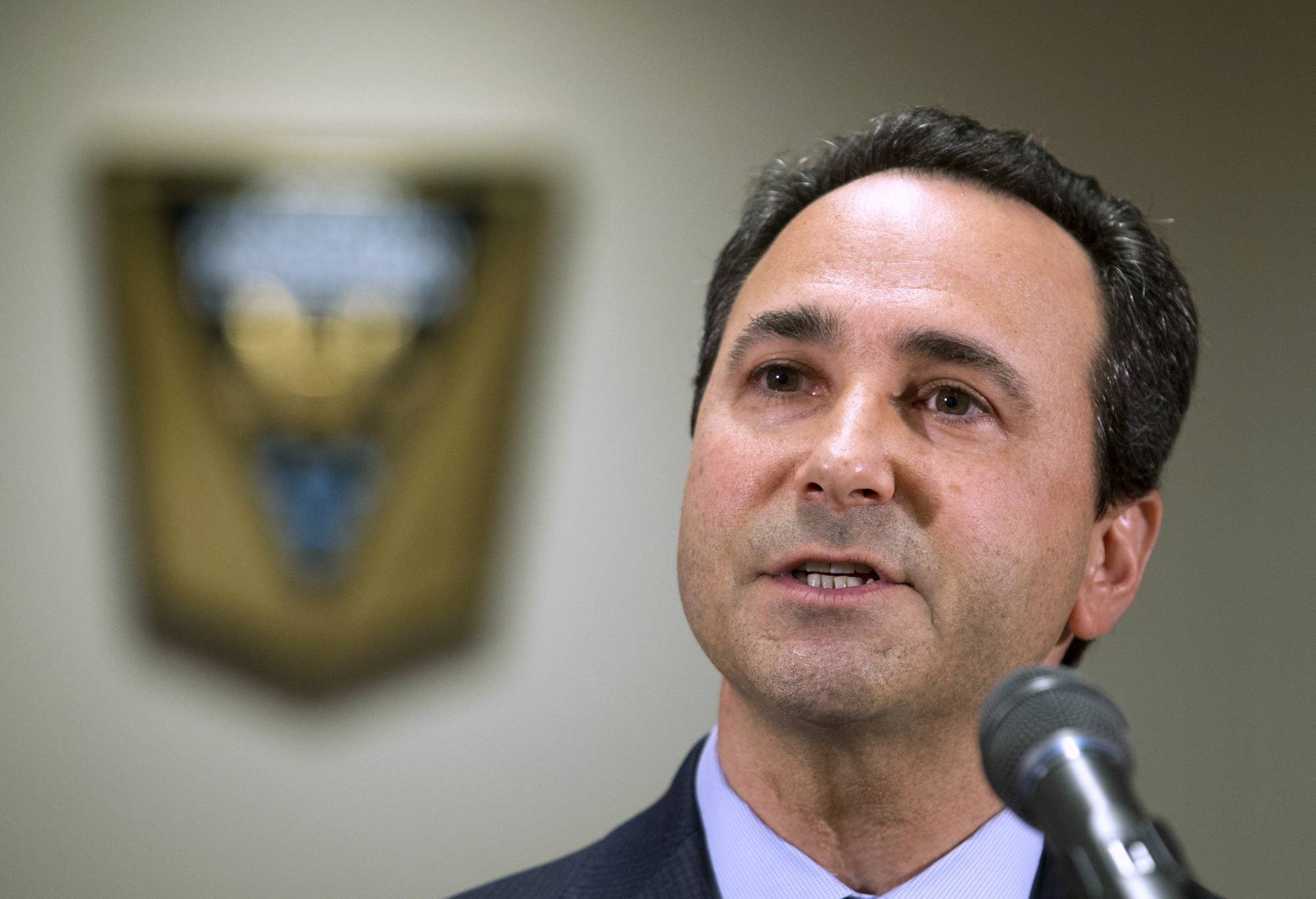First Look
Acquisition Policy
Read more
Big telework changes at Small Business Administration
In today's Federal Newscast: There are some big telework changes at the Small Business Administration. The Office of Personnel Management retirement claims backlog...
- Small business contracting will get a makeover under a new Senate bill. Sen. Joni Ernst (R-Iowa), ranking member of the Small Business Committee, wants to end what she calls too many “easy As” on the Small Business Administration’s annual scorecard. Her new bill would limit the amount credit agencies can receive for awards to small firms and would revamp the goaling structure. Ernst introduced the Accountability and Clarity in Contracts to Engage Small Suppliers and Small Businesses (ACCESS) Act yesterday, as the first step to make these and other major changes to federal small business contracting. One provision would mandate the use of the "rule of two" for all contracting actions and another would change the SBA scorecard to focus more on the composition of the industrial base.(Sen. Ernst to agencies: No more 'easy As' on the SBA scorecard - Federal News Network)
- Federal wildland firefighters are inching closer to the edge of a steep pay cliff. The frontline workers got a major pay boost as part of the Infrastructure Investment and Jobs Act, but the temporary funding for that pay raise runs out on Sept. 30. Firefighters and officials at the National Federation of Federal Employees plan to meet with congressional leaders next week in support of the Wildland Firefighter Paycheck Protection Act. They are urging passage of the bill to make the pay raise permanent before the end of the month. Without the legislation, federal wildland firefighters would see cuts to their base pay by at least 50% and in some cases up to $20,000 annually.
- A longtime member of the Postal Service’s regulatory body defends a closer look at the agency’s sweeping changes. The Postal Regulatory Commission (PRC) is moving ahead with a public inquiry into massive USPS network changes, over the objections of Postmaster General Louis DeJoy. Robert Taub, a member of the commission since 2011, said the regulator is well within its jurisdiction to oversee the sweeping changes. “It may be the most fundamental change to the network since Ben Franklin was postmaster general,” Taub said. Taub also said that the PRC has not done anything to stop, alter [or] change the trajectory of USPS’ 10-year reform plan. President Joe Biden nominated Taub to serve a third six-year term on the commission.(USPS regulator defends probe into ‘far-reaching’ network shakeup - Federal News Network)
- The rulemaking process for sweeping new cybersecurity regulations is nearing a crucial stage. The Cybersecurity and Infrastructure Security Agency is nearly finished writing a notice of proposed rulemaking for cyber incident reporting requirements. Director Jen Easterly said CISA hopes to have the notice out this year or in early 2024. The rules are not expected to become effective until 2025. They will require critical infrastructure organizations to report cyber incidents to CISA within 72 hours of discovering them. (CIRCIA, CMMC inch closer with rulemaking marathons nearing crucial stage - Federal News Network)
- Close to four years after its inception, the Space Force has its own mission statement. After asking for submissions from Guardians, and receiving 135 responses in just two weeks, the service picked the following motto: "Secure our nation’s interests in, from, and to space.” In July, officer, enlisted and civilian Guardians from four field commands and major commands participated in a series of eight focus groups to provide feedback and further shape the language for the new mission statement.(Space Force announces new mission statement - Space Force)
- The Senate is moving forward with three of its 12 appropriations bills. Measures dealing with Military Construction and Veterans Affairs; Transportation and Housing and Urban Development; and Agriculture are slated for a floor vote early next week. That is after the Senate advanced all 12 of its appropriations bills out of committee with bipartisan support. Senate Majority Leader Chuck Schumer (D-N.Y.) urged the House to reach across the aisle and push forward with its own appropriations package to avoid a possible government shutdown.(Majority Leader Schumer floor remarks - Senate Democrats)
- The General Services Administration's Federal Acquisition Service will complete its much-anticipated reorganization by early fiscal 2024. FAS Commissioner Sonny Hashmi said the new structure will replace the regional offices with a centralized reporting model. One of the biggest changes is that every agency customer will no longer work with various FAS teams, but have one set of experts to address all their products, services and other needs. Hashmi said the goal of the reorganization will be to improve how FAS serves federal agency customers and simplify their interactions with GSA staff.
- The Pentagon plans to focus on three areas to improve its acquisition process. Deputy Undersecretary of Defense for Acquisition and Sustainment Rodha Plumb said her office will prioritize better use of acquisition tools and authorities, and the use of the adaptive acquisition framework. A second priority is removing barriers to integration and making sure new systems have joint operability and are secure and compliant. The third priority is recruiting and training the acquisition workforce. Plumb said the Defense Department is offering new incentives and a scholarship-for-service program to attract new workers.(Pentagon’s top three priorities for a better acquisition program - Federal News Network)
- The Small Business Administration is setting a new baseline of in-office workdays for its executives and supervisors. Starting Sept. 25, SBA will require all political appointees, members of the Senior Executive Service and senior-level staff to report to the office for at least five days per two-week pay period. All remaining telework-eligible SBA supervisors in the National Capital Region must report to the office for at least five days per two-week pay period, starting on Nov. 5. SBA said more in-office days may be required, depending on the nature of an employee's work. (SBA sets new in-office baseline for executives, supervisors - Federal News Network)
- The Cybersecurity and Infrastructure Security Agency has new tips for how agencies can stop hackers from taking down their websites. In a new Capacity Enhancement Guide released this week, CISA told agencies how they can defend against Distributed Denial of Service attacks. That is when hackers flood a server with traffic to prevent legitimate users from accessing websites and services. CISA said agencies should consider how critical a given website or service is and then apply appropriate defenses. The cyber agency also said federal departments should get away from outdated, on-premises security solutions.
- The Office of Personnel Management (OPM) retirement claims backlog climbs for a second straight month. In August, the number of claims in the backlog rose to almost 18,000, which is a 5% increase from July. That is almost 5,000 applications above the steady state goal of 13,000. More than 7,300 federal employees filed for retirement in August, almost 1,000 more than filed in July. OPM processed almost 6,500 claims, slightly fewer than the month before. Applicants did see the monthly processing time for claims drop to 74 days, an improvement over last month's 85 days. (OPM retirement claims backlog climbs for second straight month - Federal News Network )
Copyright © 2025 Federal News Network. All rights reserved. This website is not intended for users located within the European Economic Area.
Peter Musurlian
Peter Musurlian is a producer at Federal News Network.
Follow @PMusurlianWFED






